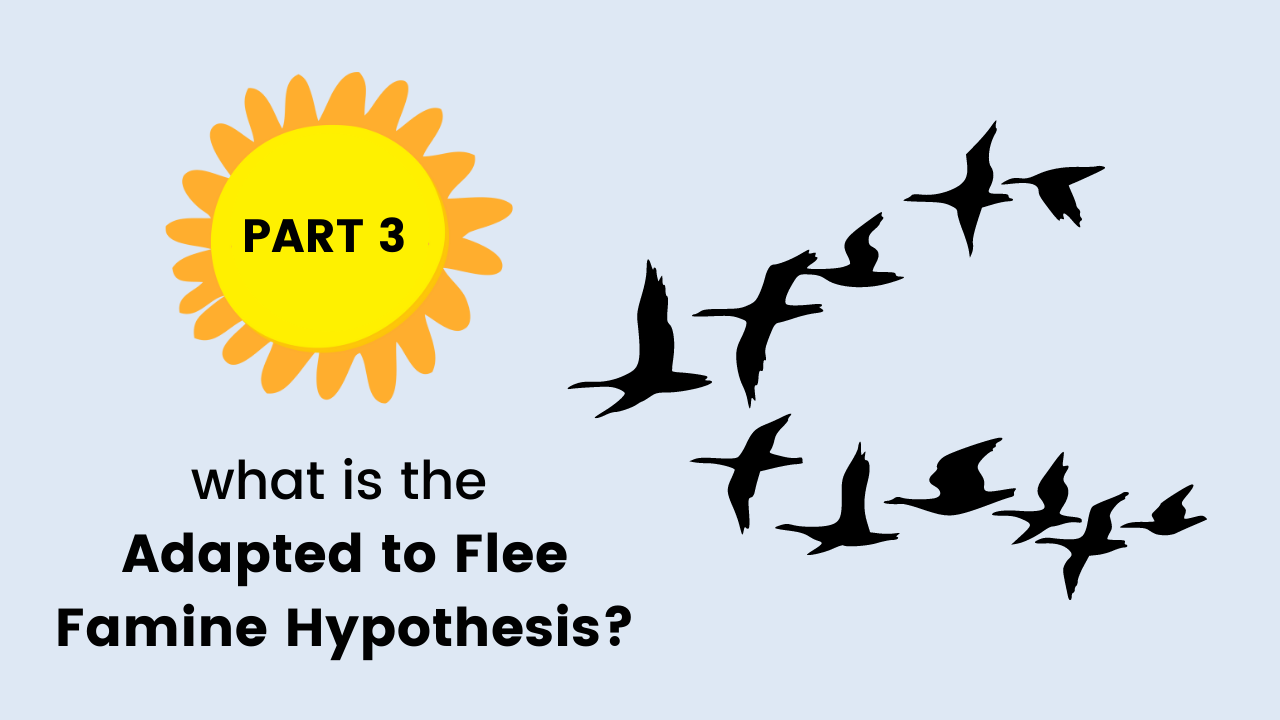What is the Adapted to Flee Famine Hypothesis? (PART 3)
Mar 22, 2022
Welcome to part 3 of my series explaining the Adapted to Flee Famine Hypothesis! If you have not yet read part 1 and part 2, I highly encourage you to do that first. A lot of the concepts discussed in those former posts will be coming back in this and following posts, so feel free to keep this tab open and come back as soon as you’re all caught up!
Now that you’ve done that, welcome back! Thus far, you’ve learned about 4 current Anorexia theories and why each theory fails to explain several crucial aspects of Anorexia Nervosa. Of course, I created this 7-part series to solve that problem, and explain an all-encompassing theory that DOES provide a comprehensive framework for the illness: the Adapted to Flee Famine Theory!
Where Traditional Treatment Fails
Because most eating disorder specialists integrate biomedical, social, and psychological theories, assuming that most women and girls feel social pressure to diet in a thin-obsessed culture, traditional treatment approaches often fail. Patients are given up on and thrown out of treatment, being told that an eating disorder is simply something they have to “manage” for the rest of their lives. When I was just 15 years old, I myself was told that I “just had to accept the fact that I would never get better”. After years of my own research and climbing myself out of the deep grave that Anorexia had been digging for me, I learned that it’s not the patients that are the problem – it’s the SYSTEM that’s using outdated and unstable approaches!
Just think about it: if professionals are basing their treatment methods off theories that lack a strong foundation, their results in practice will undeniably lack a strong foundation as well! Whereas an individual may progress towards recovery in the short-term, nothing is sustainable without solid groundwork. If you build a house on unsteady land and with cheap tools, the house will fall down at some point. The same goes for recovery; if you are attempting to build a life of freedom using vague & outdated methods, relapse is just a matter of time. Full recovery is 100% possible – but only if you are 100% committed to building the strongest possible foundation.
With the use of the AFFH, which integrates several established theories into a Darwinian framework, researchers, coaches, and healthcare providers can take a truly holistic approach to health & healing. This is the approach I personally take in my 1:1 coaching with clients, so click HERE to learn more about coaching with me. Right now, it’s time to dive deep into everything the AFFH has to offer!
What is the Adapted to Flee Famine Hypothesis?
The AFFH proposes that restricting food, hyperactivity, and denial of starvation are adaptive mechanisms that once facilitated migration in response to local famine.
A number of medical disorders are thought to arise from defenses against problems humans faced in ancestral environments, such as some forms of obesity. In times when food was scarce, being able to store extra calories as fat would have allowed individuals to survive. Similarly, Anorexia can also be viewed as an adaptive survival mechanism. Now before you think “WHAT? Anorexia relates to severe weight loss, the opposite of obesity!”, let me explain the evolutionary science.
Appetite and Survival
Appetite and eating are components of highly regulated physiological and behavioral systems. Normally, when a person or animal begins to lose weight, behavioral and neuroendocrine mechanisms conserve energy and increase desire for food. Metabolic rate declines as much as 40% and increasing hunger prompts food searches. If starvation continues, individuals become obsessed with eating, lethargic, and depressed. In environments where food is abundant, these bodily signals would facilitate survival.
What happens in a famine environment?
However, the ecological situation during most of human history was drastically different than the society of overabundance we live in today. Many pre-agrarian human populations were hunter-gatherers that relied on their direct environment for fuel. If local resources were scarce, the individuals would have probably done better by hunting and gathering somewhere else. To migrate efficiently, individuals’ bodies would have to turn off the usual adaptations to starvation, such as extreme fatigue and painful hunger pangs.
The ability to stop foraging locally and ignore food, to feel restless and energetic, and to deny one’s dangerously thin appearance are proposed by the AFFH to be adaptive mechanisms that would have facilitated migration to abundant lands and in turn, maximize chances of survival.
In the next 3 posts, I’ll be unpacking each of these core principles and explain why they are plausible adaptations for Anorexia being an evolved response to famine. You’ll also learn how all of this knowledge can be used to successfully treat and fully recover from Anorexia. I did it, which means you can too! View the full Adapted to Flee Famine Hypothesis series here.
Adapted to Flee Famine Hypothesis FULL TEXT




